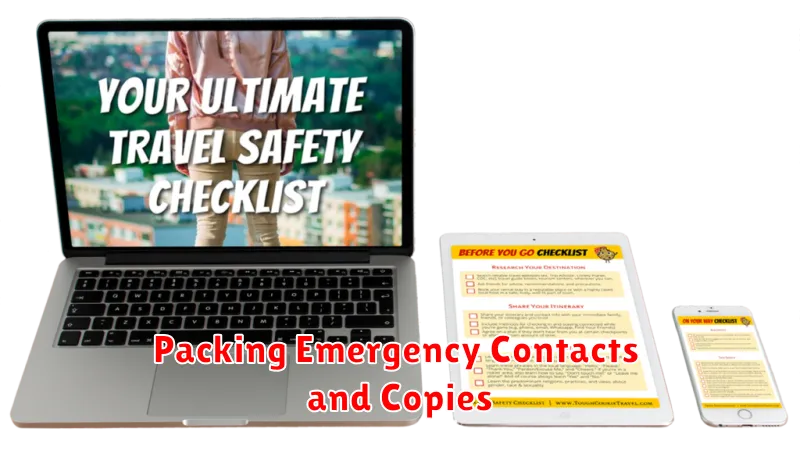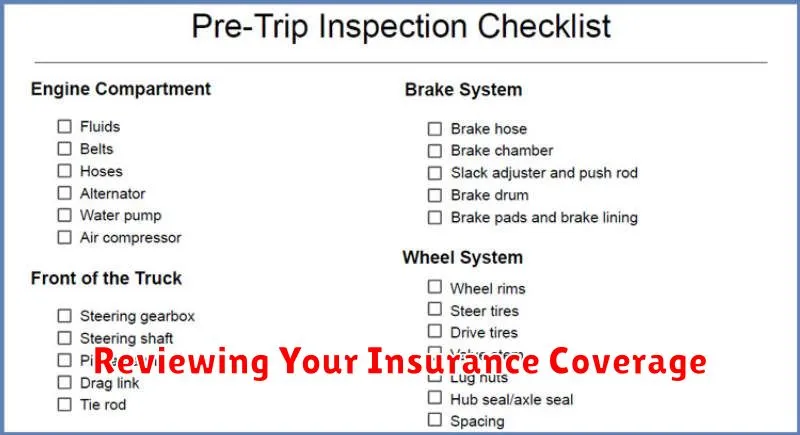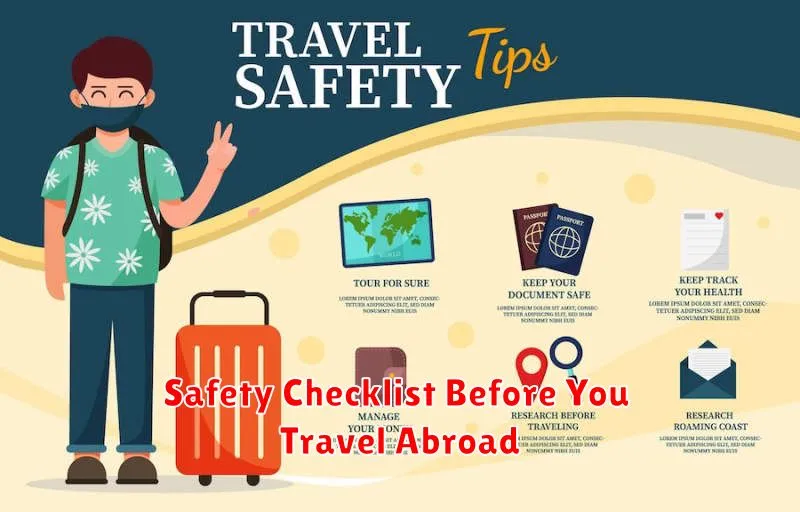Planning an international trip? Ensuring your safety while traveling abroad is paramount. This safety checklist provides essential steps to take before you depart, covering everything from travel documents and health precautions to financial security and communication strategies. By addressing these pre-travel safety measures, you can minimize potential risks and enjoy a smooth, secure, and unforgettable experience in your destination of choice. From understanding visa requirements and obtaining travel insurance to packing a first-aid kit and researching local customs, this checklist will equip you with the knowledge and resources necessary for a safe and worry-free journey.
This comprehensive guide will delve into crucial aspects of travel safety, offering practical tips and actionable advice to safeguard yourself against common travel pitfalls. We’ll explore how to protect your valuables, stay connected with loved ones, and navigate unfamiliar environments with confidence. Whether you’re a seasoned globetrotter or embarking on your first international adventure, this pre-travel checklist will empower you to travel responsibly and ensure your safety and well-being throughout your travels. Prepare for your trip with confidence, knowing you’ve taken the necessary precautions for a safe and enjoyable experience abroad.
Confirming Passport and Visa Requirements
Traveling internationally requires careful preparation, especially regarding your passport and visa. Passport validity is crucial. Many countries require your passport to be valid for at least six months beyond your intended stay. Ensure your passport has enough blank pages for entry and exit stamps. Check your passport’s expiration date well in advance of your trip and renew it if necessary. Visa requirements vary significantly depending on your nationality and destination. Research the specific visa requirements for your destination country well ahead of your departure date.
Confirming these requirements is easy. Start by visiting the official website of the embassy or consulate of your destination country. You can also consult with a travel agent or use reputable online resources that provide up-to-date visa information. These resources will outline the necessary documents, application procedures, and any associated fees. It’s important to gather all required documents accurately and completely to avoid delays or complications.
By taking the time to verify and fulfill both passport and visa requirements early in the planning process, you can ensure a smooth and stress-free travel experience. Don’t wait until the last minute; addressing these crucial details in advance will allow you to focus on enjoying your trip.
Notifying Your Bank and Credit Card Providers
When traveling, especially internationally, it’s crucial to inform your bank and credit card providers of your travel dates and destinations. This proactive step helps prevent your transactions from being flagged as suspicious and potentially blocked. Failure to notify them could result in declined purchases or ATM withdrawals, leaving you stranded without access to funds. Provide them with your travel dates, destinations, and contact information. This simple precaution can save you significant hassle and stress during your trip.
Most banks and credit card companies offer convenient ways to set travel notifications. You can typically do this online through their website or mobile app, or by calling their customer service line. Some institutions even allow you to set up recurring travel notifications if you frequently travel to the same locations. Confirming the specific notification process with your individual providers ensures a smooth and worry-free travel experience.
In addition to setting travel notifications, it’s also wise to carry a list of your bank and credit card contact information. This includes customer service phone numbers, as well as your account numbers. Keep this information separate from your cards in a secure location, in case your cards are lost or stolen. Having easy access to these details will expedite the process of reporting and resolving any issues that may arise while you are away.
Checking Travel Advisories for Your Destination
Before traveling internationally, it’s crucial to check travel advisories issued by your government. These advisories provide important information regarding safety and security concerns, health risks, entry and exit requirements, and local laws and customs at your destination. Paying attention to these advisories can help you avoid potential problems and make informed decisions about your trip. Be sure to consult the official government website for the most up-to-date and accurate information.
Travel advisories are typically categorized by levels, ranging from exercise normal precautions to avoid all travel. Each level indicates the severity of the situation in the destination country. Factors influencing these levels include political instability, crime rates, health outbreaks, natural disasters, and terrorist threats. Understanding the meaning of each advisory level is essential for assessing the potential risks involved in your travel plans.
In addition to checking your government’s travel advisories, consider consulting advisories issued by international organizations. These can offer a broader perspective on global events and risks. Remember to stay informed about changes in the advisory level for your destination both before and during your trip. Situations can evolve quickly, so staying up-to-date is vital for your safety and well-being while traveling abroad.
Packing Emergency Contacts and Copies

In an emergency, quick access to vital information can be crucial. Pack a physical list of emergency contacts, including family, friends, and medical professionals. Include their names, phone numbers, and addresses. Additionally, create copies of important documents like your passport, driver’s license, insurance cards, and medical records. Store these copies separately from the originals in a waterproof and secure location, such as a resealable bag or a dedicated travel document organizer. This simple step can save valuable time and reduce stress during a crisis.
Consider storing digital copies of these documents on a password-protected device, like a phone or laptop, or in a secure cloud storage service. Ensure this information is readily accessible offline if needed. Remember to update your contact list and document copies regularly.
For international travel, having easily accessible emergency contact information for your embassy or consulate is highly recommended. Include this information with your other emergency contacts. Knowing who to contact in your home country can provide essential assistance in a foreign land.
Reviewing Your Insurance Coverage

Regularly reviewing your insurance coverage is crucial to ensure it continues to meet your evolving needs. Life changes such as marriage, having children, buying a home, or starting a business can significantly impact your insurance requirements. Failing to adjust your coverage accordingly could leave you underinsured and financially vulnerable in the event of an unexpected incident. Begin by assessing your current assets, liabilities, and potential risks. Then, compare these factors against your existing coverage limits and deductibles to identify any gaps or areas requiring adjustments.
When evaluating your policies, don’t just focus on the premium cost. While affordability is important, adequate coverage is paramount. Carefully examine the policy details, including coverage limits, exclusions, and deductibles. For example, if you’ve recently purchased a high-value item, ensure your homeowner’s or renter’s insurance provides sufficient coverage. Similarly, consider increasing your auto insurance liability coverage if your net worth has grown. Contact your insurance agent or company to discuss your options and obtain updated quotes for increased coverage or additional policies.
It’s generally recommended to review your insurance coverage at least once a year, or whenever you experience a significant life change. This proactive approach can help you avoid unpleasant surprises and ensure you have the right protection in place when you need it most. Don’t hesitate to ask your insurance provider clarifying questions and seek professional advice if you’re unsure about your coverage needs.
Securing Accommodations in Advance
Booking accommodations in advance offers several key advantages, particularly during peak travel seasons or for popular destinations. Pre-booking guarantees you a place to stay, avoiding the stress of last-minute searches which may result in limited choices or inflated prices. Additionally, securing your accommodations early allows you to carefully compare options, considering factors like location, amenities, and reviews, ultimately contributing to a more enjoyable and less stressful travel experience.
There are various methods to reserve accommodations ahead of time. Online travel agencies (OTAs) provide a convenient platform to compare prices and availability across multiple hotels and other lodging options. Directly contacting the hotel or property is another option, often allowing for personalized service and potentially better deals. Regardless of your chosen method, it’s important to confirm the booking details, including dates, room type, and cancellation policies, to avoid any surprises upon arrival.
When booking in advance, remember to consider factors such as lead time. For popular events or destinations, booking several months ahead is often recommended. Be mindful of any travel insurance requirements and cancellation policies, especially if your travel plans are subject to change. Finally, keep all confirmation documents organized and easily accessible, either electronically or physically, for a smooth check-in process.
Downloading Useful Safety Apps
In today’s world, personal safety is a paramount concern. Fortunately, technology offers tools to enhance our security. Safety apps can provide a variety of features, from emergency alerts and location sharing to personal safety tips and self-defense resources. Downloading a few reputable safety apps can offer an added layer of protection and peace of mind. Carefully consider your individual needs when choosing apps, looking for features like GPS tracking, emergency contacts, and discreet alerts.
Before downloading any safety app, research its credibility and user reviews. Look for apps developed by reputable organizations or companies with a proven track record in safety and security. Check for clear privacy policies to understand how your data is collected and used. It’s also wise to explore free trials or freemium versions of apps before committing to a paid subscription, allowing you to test their functionality and effectiveness firsthand. Ensure the app is compatible with your device and operating system for optimal performance.
Once you’ve downloaded a safety app, take the time to familiarize yourself with its features. Configure emergency contacts, practice activating alerts, and explore any educational resources offered. Remember, having a safety app is only effective if you know how to use it in a critical situation. Keep the app updated to benefit from the latest security enhancements and bug fixes. By taking these steps, you can leverage technology to enhance your personal safety and well-being.

